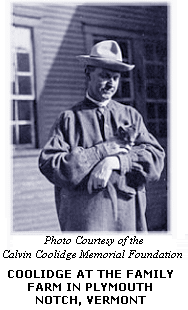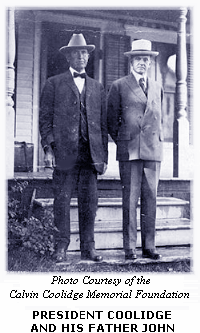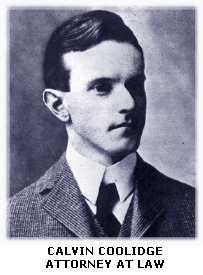|

"The second office of the government is honorable and easy; the first is but a splendid misery."
Mr. Harding died of apoplexy at 10:30 P.M. But four hours passed before the news made its way east to Vermont. So it was 2:30 A.M. when John Coolidge trudged up to the bedroom to tell his son he was President.
The elder Coolidge, a notary public, administered the oath by the light of two kerosene lamps in the sitting room of the old wooden house at 3:57 A.M. When daylight came, the new President went alone to his mother's grave. "It had been a comfort to me during my boyhood when I was troubled to be near her resting place, even in the dead of night," he said. "Some way, that morning, she seemed very near to me. "Mrs. Coolidge had died when he was twelve but her Puritan teachings stayed with him all the way from the farm to the one-room stone schoolhouse, to the academy at Ludlow, to Amherst College, to the law school at Northampton and a succession of local offices in the town, to the lower House and a dollar-a-day
No, Calvin Coolidge never forgot anything his mother told him, whether he was doing the simplest farm chores or running the State of Massachusetts or the whole U.S.A. He did all the right things according to the New England copybooks. He was frugal, honest, God-fearing, free of vices. He would have no trouble getting nominated to serve a full four-year term. He was just the man to carry on the Harding dictum--"not nostrums but normalcy"--and he himself would add a dandy expression to the language: "Coolidge Prosperity."
�
|


 Calvin Coolidge, without peer as a sleeper, in or out of high office, went to bed at 9:00 P.M. on August 2, 1923, in the family farmhouse in Vermont. Mr. Harding lay ill on the West Coast but the Vice President felt no need to keep a hand close to the throttle. Plymouth was delightfully cool and Washington was hot and muggy and there was nothing to worry about. The President's doctors had said that his Alaskan good-will journey had caused some weariness, compounded first by ptomaine poisoning from tainted crabs and then by a touch of bronchial pneumonia, but he was resting comfortably in the Palace Hotel in San Francisco. And just before Coolidge retired, someone called from the general store in the village and relayed a fresh bulletin from the medical men saying the fifty-eight-year-old President definitely was recovering.
Calvin Coolidge, without peer as a sleeper, in or out of high office, went to bed at 9:00 P.M. on August 2, 1923, in the family farmhouse in Vermont. Mr. Harding lay ill on the West Coast but the Vice President felt no need to keep a hand close to the throttle. Plymouth was delightfully cool and Washington was hot and muggy and there was nothing to worry about. The President's doctors had said that his Alaskan good-will journey had caused some weariness, compounded first by ptomaine poisoning from tainted crabs and then by a touch of bronchial pneumonia, but he was resting comfortably in the Palace Hotel in San Francisco. And just before Coolidge retired, someone called from the general store in the village and relayed a fresh bulletin from the medical men saying the fifty-eight-year-old President definitely was recovering. "My wife and I dressed at once," Coolidge said in his autobiography. "Before leaving the room I knelt down and, with the prayer with which I have since approached the altar of the church, asked God to bless the American people and give me power to serve them."
"My wife and I dressed at once," Coolidge said in his autobiography. "Before leaving the room I knelt down and, with the prayer with which I have since approached the altar of the church, asked God to bless the American people and give me power to serve them." room in Boston, to the State Senate, to the lieutenant-governorship and governorship, to the Vice Presidency and now the Presidency.
room in Boston, to the State Senate, to the lieutenant-governorship and governorship, to the Vice Presidency and now the Presidency.